Avusturya'da Mülk Satın Alma: Kim Alabilir, Nerede ve Hangi Koşullar Altında?
120
16.09.2025

✅ Yabancılar Avusturya'da Mülk Satın Alabilir mi?
Evet — ancak AB dışındaki alıcılar önemli kısıtlamalarla karşı karşıyadır ve onay genellikle gereklidir. AB vatandaşları, çoğu bölgede serbestçe alım yapabilir.
⚖️ Avusturya'da Yabancı Mülk Sahipliği Yasaları (2025)
🟢 AB/AEA Vatandaşları
-
Avusturya genelinde, arazi, daireler ve tatil evleri de dahil olmak üzere serbestçe mülk satın alabilir ve sahip olabilirler.
-
Yerel tapu dairesine kayıt yaptırmalı ve imar ile turizm yasalarına uymalıdırlar.
🔴 AB Dışı/AEA Dışı Vatandaşlar
-
Sıkı bölgesel kısıtlamalara tabidirler.
-
Çoğu durumda, bir il taşınmaz transfer otoritesinden onay almak zorundadırlar.
-
Çoğunlukla ikinci evler veya tatil mülkleri satın almalarına izin verilmez, yalnızca daimi oturum veya kayıtlı bir işletme çalıştırıyorlarsa.
-
Bazı eyaletler (Tirol veya Salzburg gibi) AB dışındaki alıcıların konut turizmi alanlarına girişini tamamen yasaklamaktadır.
✅ Kurumsal Alıcılar
- AB dışındaki vatandaşlar, AB merkezli şirketler veya Avusturya'da kayıtlı işletmeler aracılığıyla mülk satın alabilirler (hukuk yapısına ve onaya tabi).
📌 Avusturya'nın gayrimenkul yasaları her federal eyalet tarafından belirlenmektedir — bu da uzman hukuki danışmanlığın önemini ortaya koymaktadır.
🏙️ Avusturya'da Mülk Almak için En İyi Yerler (2025)
🔹 1. Viyana
-
Başkent ve ekonomik merkez.
-
Uzun vadeli şehir kiralamaları ve lüks evler için mükemmel.
-
İstikrarlı fiyatlar ve sürekli değer artışı.
🔹 2. Salzburg
-
Barok zarafeti, müzik mirası ve turizm çekim merkezi.
-
İkinci evler ve butik oteller için AB alıcıları arasında popülerdir.
🔹 3. İnsbruck ve Tirol Bölgesi
-
Avusturya Alpleri'nin kalbi — kayak mülkleri, dağ evleri ve tatil merkezleri.
-
AB dışındaki alıcılar için çok kısıtlıdır, ancak turizm sezonlarında karlı olabilir.
🔹 4. Graz
-
Avusturya'nın ikinci en büyük şehri.
-
Uygun fiyatlı mülkler ve güçlü öğrenci ve teknoloji odaklı kiralama talebi.
🔹 5. Zell am See / Kitzbühel
-
Sezonsal lüks alıcılar için yüksek kaliteli dağ tatil beldeleri.
-
Kısa süreli kiralamalar için popülerdir ancak sakinler dışındakiler için ağır kısıtlamalara tabi.
💰 2025 Yılı Ortalama Mülk Fiyatları
| Konum | Ortalama Fiyat (€/sqm) |
|---|---|
| Viyana (merkez) | €6,000–€9,000 |
| Salzburg | €5,500–€8,000 |
| Graz | €3,000–€4,800 |
| İnsbruck | €6,500–€10,000 |
| Zell am See | €7,000–€11,000 |
Alp tatil beldeleri, kıtlık ve prestij nedeniyle genellikle daha yüksek primler talep etmektedir.
📈 Kiralama Getirileri ve Yatırım Getirisi
| Şehir/Bölge | Uzun Vadeli Getiri | Kısa Vadeli ROI |
|---|---|---|
| Viyana | 3–4% | 4–6% (sınırlı) |
| Salzburg | 3–4.5% | 5–7% (turist birimleri) |
| Graz | 4–5% | 6–7% |
| Kitzbühel | 2.5–4% | 6–8% (mevsimlik) |
Airbnb tarzı kiralamalar ağır bir şekilde düzenlenmiştir, özellikle turistik bölgelerde.
🛠️ Avusturya'da Satın Alma Süreci
-
satın alma niyeti beyanı gönderin; teklif mektubu veya rezervasyon sözleşmesi ile.
-
Sözleşmeyi hazırlamak için lisanslı bir notere veya avukata danışın.
-
yabancı mülk sahipliği onayı için başvuruda bulunun (gerekirse).
-
Satın alma sözleşmesini imzalayın ve %10 kapora ödeyin.
-
İşlemi Tapu Dairesi'nde kaydedin.
📌 Tipik kapanış süresi: 8–12 hafta
AB dışındaki alıcılar için onay süresi bu süreyi uzatabilir.
🧾 Vergiler ve Harçlar
| Tür | Maliyet |
|---|---|
| Gayrimenkul Devir Vergisi | %3.5 |
| Tapu Dairesi Ücreti | %1.1 |
| Hukuk/Noter Ücretleri | %1.5–3% |
| Emlakçı Ücreti (varsa) | %3–4% + KDV |
| Gayrimenkul Vergisi (yıllık) | ~%0.1–0.2 değer biçilen değerin |
| Değer Artış Vergisi | Kazançların %30'u (istisnalar uygulanmadıkça) |
| Kira Geliri Vergisi | %55'e kadar artan oranlı, deductible harcamalar izinlidir |
🛂 Mülk Satın Almak Oturum İzni Sağlar mı?
❌ Hayır — mülk satın almak otomatik olarak vize veya oturum izni sağlamaz.
Ancak:
-
Eğer bir varlık temelli veya emekli oturum izni başvurusu yaparsanız, gayrimenkul sahibi olmak başvurunuzu güçlendirebilir.
-
Avusturya, yetenekli çalışanlar ve iş yatırımcıları için Kırmızı-Beyaz-Kırmızı Kart sunmaktadır, ancak bu mülk alımına doğrudan bağlı değildir.
🏘️ Avusturya'da Kimler Yatırım Yapmalı?
✅ İdeal olanlar:
-
düzenli bir piyasada istikrarlı yatırım arayan AB vatandaşları
-
miras kalacak mülkler veya Alplerde yaşam evleri arayan alıcılar
-
uzun vadeli kiralamalar veya premium turistik bölgeler ile ilgilenen yatırımcılar
-
Avrupa içinde taşınmayı planlayan aileler
❌ İdeal olmayanlar:
-
Profesyonel hukuki yapılandırması olmayan AB dışındaki vatandaşlar
-
Hızlı değer artışı arayan satıcılar
-
oturum veya vize almak için yatırım yapmak isteyen yatırımcılar
🔮 2025 Trendleri ve Görünüm
-
Avusturya, düşük dalgalanma ve yüksek hukuki şeffaflık ile güvenli bir liman pazarı olmaya devam etmektedir.
-
Alp bölgeleri, artmış imar kısıtlamaları ile karşı karşıya.
-
Sürdürülebilir yapılar ve enerji verimliliği iyileştirmeleri, şimdi yeni gelişmelerin merkezinde.
-
Viyana ve Graz, kira geliri için güçlü bölgeler olmaya devam etmektedir.
-
Kurumsal yapılar (AB merkezli kuruluşlar) giderek daha fazla AB dışındaki yatırımcılar tarafından kullanılmaktadır.
🧭 Son Düşünceler
Avusturya, yatırımcılara hukuki güvenlik, para biriminin istikrarı (euro bölgesi) ve yüksek yaşam standartları sunmaktadır, ancak bu herkes için uygun bir pazar değil. AB vatandaşları için, uzun vadeli değer artışı ve düşük riskli getiriler için güçlü bir tercihtir. AB dışındaki yatırımcılar için karmaşık eyalet onay yasalarını aşmak adına uzman rehberliği esastır.
Alp tatil beldeleri, Viyana kiralamaları ve miras kalacak mülkler, doğru hukuki adımlarla güçlü yaşam ve finansal kazançlar sağlayabilir.
Herhangi bir sorunuz mu var veya tavsiye mi istiyorsunuz?
Bir talep bırakın
Uzmanımız, görevleri tartışmak, çözümleri seçmek ve işlemin her aşamasında iletişimde kalmak için sizinle iletişime geçecektir.
